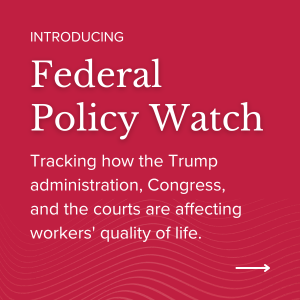Latest Research
-
The Trump administration’s short-sighted attacks on the Federal Mediation and Conciliation Service
-
The Trump administration’s macroeconomic agenda harms affordability and raises inequality
-
Workers’ resolve drives increase in unionization in 2025
-
Everything you need to know about “no tax on overtime”
-
Rights to unionize and collectively bargain: State solutions to the U.S. worker rights crisis
Blog
-
EPI’s updated Family Budget Calculator shows that higher minimum wages are needed in states like Oklahoma to afford the cost of living
-
How Trump’s economic policies are worsening affordability
-
Employer assessment fees are not an adequate solution to low wages and large safety net cuts
-
You can’t starve the public sector to excellence
-
Indiana lawmakers are once again trying to weaken child labor laws: Bill sponsored by business owner would enable employers to hide child labor violations
-
We’ve been here before, and we know what comes next: White supremacy has always been used to usher in massive economic inequality
-
A growing number of workers went on strike in 2025
EPI in the news
-
Indeed.com | March 4, 2026
-
Forbes | March 4, 2026
-
Cardinal News (Virginia) | March 4, 2026
-
Far & Wide | March 4, 2026
-
AARP | March 4, 2026
-
Newsweek | March 4, 2026
-
CNBC | March 4, 2026





